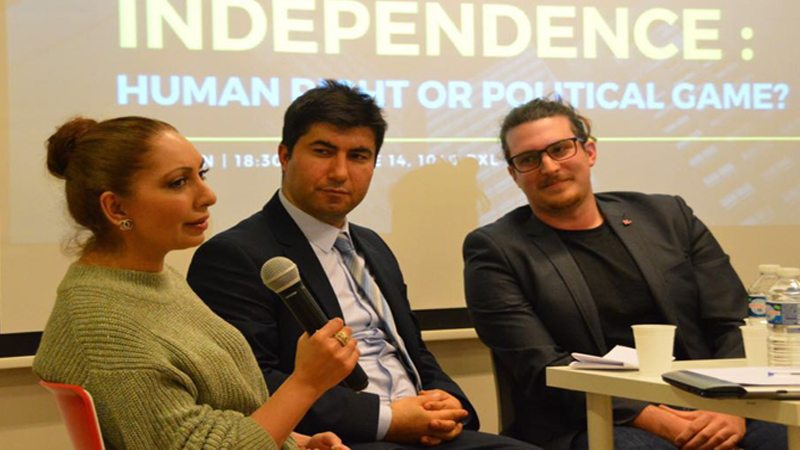Dr Shamila Mehmood speaks about Kashmir to EU gathering


The conference, that took place at Science 14 in Brussels, gathered a panel of experts on human rights and international law putting forward proposals for renewed approaches to this issue. The keynote speaker was Dr Igor Šoltes, Member of the European Parliament and co-founder of the EU-Catalonia Dialogue Platform while the other speakers included Pakistan based international law expert Dr Shamila Mehmood and President of Kurdish European Society Kahraman Evsen.
Dr Shamila Mahmood, an expert in international law, who focused on the region of Kashmir started her discussion by recollecting the history of the region from 1947, when both Pakistan and India become independent, internationally recognized countries.
Since when Kashmir was taken over by India, the question of independence started with attempts to solve the issue via international law, such as the resolution of 1948 concerning the need for a plebiscite and a referendum.
“However, such measures were never taken, and the region became a theatre to many human rights abuses, such as murder, maiming and systematic rape,” she asserted, adding that the situation never really improved as, for example, in 1987 a local independence movement started but it was met only with further violence, like the use of pellet guns in the last few years.
She was of the view that the international community must be much more active to make sure a peaceful resolution to this struggle is found. Dr Shamila pointed that at least 1,248 children below the age of 15 were among 9,010 people injured in the crackdown to quell protests triggered by the killing of the young man in a joint operation by police and the Army in south Kashmir on July 8, according to J&K government figures.
Dr Shamila told the audience that a deliberate campaign by the Indian army and paramilitary forces against the Kashmiris has been manifested in brutal tactics such as crackdowns, curfews, illegal detentions, massacre, targeted killings, sieges, burning the houses, torture, disappearances, rape, breaking the legs, molestation of Muslim women and killing of persons through fake encounter since 1989.
She mentioned that the 1948 UN’s resolution on the topic already provides a framework to work with to cease hostilities. It is now time for the international community to persuade the regional powers to come to a satisfactory agreement that would put an end to the violence and abuses.
“We believe a concrete end to the tensions would also entail the application of democratic process with the use of a plebiscite, as that would settle the questions by letting the people in the territory decide,” she stated.
She said that the EU could play a significant role as it was founded upon the values of peace and collaboration and has the diplomatic and economic force to make a difference.
“We invite European decision makers, as well as other international forces, to work for the peace process in the region of Kashmir, so that people in the region can stop suffering and make their own decision of where they want to move forward as a community.
Dr Šoltes, tapping into his decade long expertise in international law, argued that the resolution to the demand of independence of certain regions, when happening through democratic means, must rely on existing legal frameworks.
In reference to Catalonia, he reminded the audience that both the Venice Commission as well the European Convention on Human Rights could provide spaces for a debate. However, he argued, the EU has a key role to play in the dialogue and the issue cannot be dismissed simply as a national question. This also means the EU cannot have double-standards when it comes to the demands for freedoms by citizens, one within its border and one outside of it.
The last panellist to speak was Mr Erik Edman, a representative of DiEM25 in Belgium. He offered a political perspective on the position of the European Union. His view is that the EU is showing a particularly negative track record when it comes to the struggle of citizens, particularly if we look at the events and violence in Catalonia, displaying a lack of creativity and little regard to the value of democracy.
Evsen focused on the way which the Kurdish people, formally residing in different States in the Middle-East, are struggling to form a united Kurdish independent country.
He stated that many hopes were born around the independence referendum that took place in Iraq in 2017 but that, since then, as nothing really changed, the Kurds are feeling that they have been exploited by the West in the fight against ISIS but abandoned when it was defeated.
He concluded that the Kurdish people need to be protected by international law and human rights to be successful in their struggle.
The event concluded with the Q&A session about topics like the economic sustainability of Kurdistan, violence in Kashmiri elections, and the best way to cope with the Catalan crisis on the day of the referendum.
Published in Daily Times, February 2nd 2018.
Leave a Comment